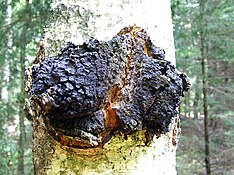Inonotus obliquus
| Inonotus obliquus | |
|---|---|
 |
|
| Scientific classification | |
| Kingdom: | Fungi |
| Division: | Basidiomycota |
| Class: | Agaricomycetes |
| Order: | Hymenochaetales |
| Family: | Hymenochaetaceae |
| Genus: | Inonotus |
| Species: | I. obliquus |
| Binomial name | |
|
Inonotus obliquus (Ach. ex Pers.) Pilát (1942) |
|
| Synonyms | |
|
Boletus obliquus Ach. ex Pers. (1801) |
|
Boletus obliquus Ach. ex Pers. (1801)
Polyporus obliquus (Ach. ex Pers.) Fr. (1821)
Physisporus obliquus (Ach. ex Pers.) Chevall. (1826)
Poria obliqua (Ach. ex Pers.) P.Karst. (1881)
Fomes obliquus (Ach. ex Pers.) Cooke (1885)
Phaeoporus obliquus (Ach. ex Pers.) J.Schröt. (1888)
Mucronoporus obliqua (Ach. ex Pers.) Ellis & Everh. (1889)
Scindalma obliquum (Ach. ex Pers.) Kuntze (1898)
Phellinus obliquus (Ach. ex Pers.) Pat. (1900)
Xanthochrous obliquus (Ach. ex Pers.) Bourdot & Galzin (1928)
Fuscoporia obliqua (Ach. ex Pers.) Aoshima (1951)
Inonotus obliquus, commonly known as chaga mushroom (a Latinisation of the Russian term 'чага'), is a fungus in the family Hymenochaetaceae. It is parasitic on birch and other trees. The sterile conk is irregularly formed and has the appearance of burnt charcoal. It is not the fruiting body of the fungus, but a sclerotia or mass of mycelium, mostly black because of the presence of massive amounts of melanin. The fertile fruiting body can be found very rarely as a resupinate (crustose) fungus on or near the clinker, usually appearing after the host tree is dead. I. obliquus grows in birch forests of Russia, Korea, Eastern and Northern Europe, northern areas of the United States, Alaska, in the North Carolina mountains and in Canada.
...
Wikipedia
